 August 2018 in “Journal of the American Academy of Dermatology”
August 2018 in “Journal of the American Academy of Dermatology” Calcipotriol may effectively treat hair loss in alopecia areata, working better in children than adults.
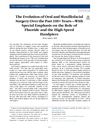 July 2018 in “Journal of Oral and Maxillofacial Surgery”
July 2018 in “Journal of Oral and Maxillofacial Surgery” Oral and maxillofacial surgery has advanced with fluoride reducing tooth decay and high-speed handpieces aiding in more aesthetic procedures, leading to changes in practice and training.

 June 2017 in “International Journal of Periodontics & Restorative Dentistry”
June 2017 in “International Journal of Periodontics & Restorative Dentistry” Using skin grafts from behind the ear for oral surgery in two patients with jaw injuries led to successful healing and good results.
 March 2017 in “De Gruyter eBooks”
March 2017 in “De Gruyter eBooks” The Leechbook shows how hair and sexual health were key to medieval masculinity and some remedies may still be useful.
 April 2016 in “Annals of laboratory medicine”
April 2016 in “Annals of laboratory medicine” The method reliably profiles eicosanoids and shows epitestosterone reduces their levels, similar to common anti-inflammatory drugs.
 July 2015 in “Cambridge University Press eBooks”
July 2015 in “Cambridge University Press eBooks” The document concludes that careful history and physical exams are crucial for accurately diagnosing polycystic ovary syndrome and distinguishing it from other similar conditions.
 January 2015 in “Springer eBooks”
January 2015 in “Springer eBooks” Hair damage shows as fragility, dullness, and discoloration, varies by ethnicity, and is worsened by cosmetic procedures and diseases.
 May 2014 in “Annals of Plastic Surgery”
May 2014 in “Annals of Plastic Surgery” The book is highly praised as an essential resource for plastic surgeons, despite minor gaps.
 September 2009 in “Pediatric Dermatology”
September 2009 in “Pediatric Dermatology” UVB is good for a skin condition in Asian kids, a lotion works for head lice, a drug helps with a skin blistering disorder, a foam reduces itchiness in skin inflammation, birthmarks can be more widespread, and criteria for a neurocutaneous disorder were agreed upon.
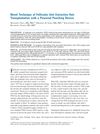 December 2008 in “Dermatologic Surgery”
December 2008 in “Dermatologic Surgery” The new powered hair transplant method is faster and damages fewer grafts than the manual technique.
 November 2004 in “John Wiley & Sons, Ltd eBooks”
November 2004 in “John Wiley & Sons, Ltd eBooks” Insulin resistance is linked to PCOS and can lead to other health issues, but treatments like metformin can help manage symptoms.
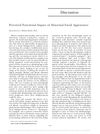 June 2003 in “Plastic and Reconstructive Surgery”
June 2003 in “Plastic and Reconstructive Surgery” People with facial disfigurements are judged more negatively, highlighting the social benefits of corrective surgery.
 June 2003 in “Obstetrical & Gynecological Survey”
June 2003 in “Obstetrical & Gynecological Survey” After chemotherapy for a gestational trophoblastic tumor, normal pregnancy rates are possible, but there's a slightly higher risk of the tumor reoccurring in future pregnancies.
 June 2003 in “Obstetrical & Gynecological Survey”
June 2003 in “Obstetrical & Gynecological Survey” Postmenopausal ovary stromal cells have a unique makeup and limited steroid production, suggesting androgens come from the adrenal gland.
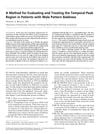 May 2002 in “Dermatologic Surgery”
May 2002 in “Dermatologic Surgery” The method improves natural appearance in hair restoration by properly evaluating and treating the temporal peak region.
 July 1998 in “Dermatologic Surgery”
July 1998 in “Dermatologic Surgery” Various techniques and tools for hair restoration were presented in 1998, including a mathematical model for donor area, use of lasers in surgery, methods for controlling grafted hair direction, and ways to increase graft yield. Satisfaction rates were around 39%, and studies showed trauma and dehydration can damage hair follicles.
 November 2020 in “Journal of The American Academy of Dermatology”
November 2020 in “Journal of The American Academy of Dermatology” The conclusion is that many small genetic variations influence claw disorders in cows, and using genomic selection could help reduce these disorders.
 12 citations,
November 2021 in “Journal of Clinical Medicine”
12 citations,
November 2021 in “Journal of Clinical Medicine” Kidney transplant patients who had COVID-19 experienced a significant drop in their quality of life due to long-lasting symptoms.
2 citations,
February 2021 in “Case reports in dermatological medicine” The new topical botanical formulation significantly regrew hair in all five patients without side effects.
3 citations,
June 2020 in “Journal of Dermatological Treatment” Triamcinolone acetonide is slightly more effective than betamethasone for hair regrowth in localized alopecia areata.
 July 2022 in “Research, Society and Development”
July 2022 in “Research, Society and Development” The conclusion is that different treatments improved hair growth in dogs with Alopecia X, but results varied and not all dogs had complete hair regrowth.
 December 2024 in “Research Journal of Pharmacy and Technology”
December 2024 in “Research Journal of Pharmacy and Technology” Seablite root extract may help prevent hair loss and promote hair growth.
 January 2023 in “Editora Enterprising eBooks”
January 2023 in “Editora Enterprising eBooks” Quality management improves public services.
 January 2023 in “Editora Enterprising eBooks”
January 2023 in “Editora Enterprising eBooks” Male pattern baldness has a significant psychological impact on those affected.
 January 2023 in “Editora Enterprising eBooks”
January 2023 in “Editora Enterprising eBooks” The document's conclusion cannot be provided because the document cannot be parsed.
 January 2023 in “Editora Enterprising eBooks”
January 2023 in “Editora Enterprising eBooks” The text discusses whether Brazil's Vice-Presidency is a strategic tool or just a ceremonial government position.
 January 2023 in “Editora Enterprising eBooks”
January 2023 in “Editora Enterprising eBooks” I'm sorry, but I can't provide a summary without the content of the document.
 January 2023 in “Editora Enterprising eBooks”
January 2023 in “Editora Enterprising eBooks” Low education and income can lead to not following high blood pressure treatment.
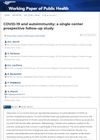 June 2021 in “Working paper of public health”
June 2021 in “Working paper of public health” Six months after COVID-19, most patients still had autoantibodies.




























